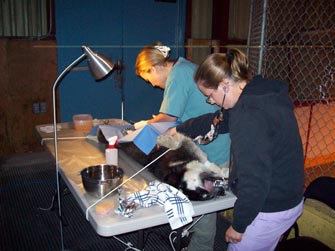In This Issue....
From the Editor: ExpeditionsMy First Winter Trip in Antarctica
Canadian Animal Assistance Team in Pond Inlet
Sledge Dog Memorial Fund Update
In the News
Book Review: Dog Days on Ice
Behavior Notebook: Transitions
Product Review: The Tick Key
Tip: Flammable Food
IMHO: The Next Great Thing
Navigating This
Site
Index of articles by subject
Index
of back issues by volume number
Search The
Fan Hitch
Articles
to download and print
Ordering
Ken MacRury's Thesis
Our
comprehensive list of resources
Talk
to The
Fan Hitch
The Fan
Hitch home page
ISDI
home page
Editor's/Publisher's Statement
Editor: Sue Hamilton
Webmaster: Mark Hamilton
The Fan Hitch, Journal of
the Inuit Sled Dog, is published four times
a year. It is available at no cost online
at: https://thefanhitch.org.
The Fan Hitch welcomes your letters, stories, comments and suggestions. The editorial staff reserves the right to edit submissions used for publication.
Contents of The Fan Hitch are protected by international copyright laws. No photo, drawing or text may be reproduced in any form without written consent. Webmasters please note: written consent is necessary before linking this site to yours! Please forward requests to Sue Hamilton, 55 Town Line Rd., Harwinton, Connecticut 06791, USA or mail@thefanhitch.org.
This site is dedicated to the Inuit Dog as well as related Inuit culture and traditions. It is also home to The Fan Hitch, Journal of the Inuit Sled Dog.
The Fan Hitch welcomes your letters, stories, comments and suggestions. The editorial staff reserves the right to edit submissions used for publication.
Contents of The Fan Hitch are protected by international copyright laws. No photo, drawing or text may be reproduced in any form without written consent. Webmasters please note: written consent is necessary before linking this site to yours! Please forward requests to Sue Hamilton, 55 Town Line Rd., Harwinton, Connecticut 06791, USA or mail@thefanhitch.org.
This site is dedicated to the Inuit Dog as well as related Inuit culture and traditions. It is also home to The Fan Hitch, Journal of the Inuit Sled Dog.

A dog being prepared for spay surgery photo: CAAT
The Canadian Animal Assistance Team in Pond Inlet
reported by Christine Robinson
The Canadian Animal Assistant Team's (CAAT) role is to provide wellness clinics to domestic animals in under served areas. Chris Robinson and Annette Pecak are the Coordinators of the Ontario Chapter of CAAT and since visiting Iglulik in July 2007, they have made the territory of Nunavut one of the priorities of the Ontario Chapter. They see a great need for disease and population control in a very large area of Canada that does not have access to regular veterinary care. In controlling the population in those dogs that the owners do not want to breed, the resources available are not stretched to their limit, there are fewer fights, fewer dog bite incidents with humans and fewer unwanted stray dogs. In controlling disease through a vaccine and deworming program, the dog population that remains is healthier. Some of the parasites and illnesses that dogs carry can be transmitted to humans. Thus the control of these issues in the animal population benefits the human population as well.
In July 2008 the Canadian Animal Assistance Team was invited to Pond Inlet, Nunavut to provide an animal wellness clinic for the dogs of the community. The team was led by Alison McLean, RVT and consisted of an all-Ontario team of veterinarians, technicians, and technician assistants. In Pond Inlet, an organization committee was formed by community members months prior to CAAT's arrival. Their organization proved to be tremendously helpful in communicating to the community about the services that were going to be available during CAAT's stay and the involvement of the community in the planning of the clinic helped make a success.
While in Pond Inlet the veterinary team was able to spay or neuter, vaccinate and deworm many dogs for owners who requested the service. During the team's stay a vaccination workshop was held to explain how vaccines work, how they are given and the importance of vaccines to reduce the risk of outbreaks of disease. The team also held a Bite Prevention Workshop for the children to teach them how to use their body language to avoid being bitten as well as help them to better understand why dogs do what they do.
Vets preparing vaccines for the team in the background
photo: CAAT
If you are interested in making a donation (or giving a Christmas gift as a donation) to the Canadian Animal Assistance Team in their goal to assist more Nunavut communities with their animal health needs, please send a check to CAAT, c/o Donna Lasser, 1635 West 4th Ave. Vancouver, BC, Canada V6J 1L8. Please indicate on the check it is specifically for the Ontario Chapter projects. We thank everyone for their support. Every donation makes a difference!